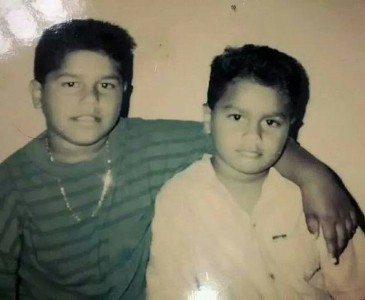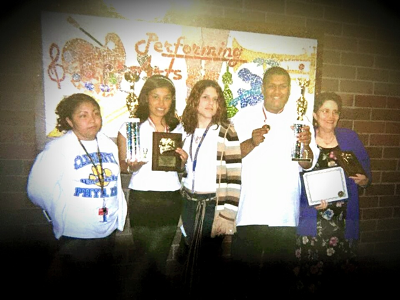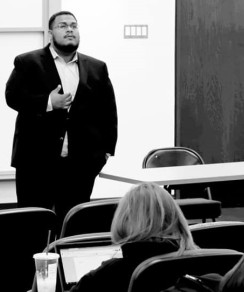We Were Never Black
Growing up in Puerto Rico, I knew the color of my skin. Everyone reminded me of it. I was often called “trigueño,” a color somewhere in between Black and white. A simple dictionary search will tell you that I have the color of yellowish dark wheat. Even though my father was a Black Puerto Rican, my mother’s father was a Black man, and though my skin color was similar to theirs, we were never Black. While I have always been a Black Puerto Rican, also known as an Afro-Latino, I had to learn how to be Black.
The colonization of Puerto Rico and Latin America by the Spanish has left behind vestiges of white supremacy and racism. The Spanish invented the ideas of “razas” (race) to classify groups as superior or inferior. Almost a century before enslaved Black Africans were stolen from their homelands and brought to U.S. colonies by the British, the Spanish had already enslaved millions of Black Africans in Latin America. The enslavement of Black Africans happened shortly after the Spanish conquered Indigenous lands and exterminated millions of individuals by spreading diseases and enslaving these people. This history of conquest, colonization, and enslavement frames Black and Indigenous history in Latin America, and its effects impact us today.
 From early on (that's me, at right in photo, with my older brother), I knew I was ethnically Puerto Rican. It was also my nationality. Those things are taught to us very early in Puerto Rican schools. We learn about our culture, notably the racial harmony that supposedly exists in our archipelago. From an early age, I was conditioned to believe that our culture is a mixture of three cultures: Spanish, Taino, and African. Yet this racial trilogy is very limiting since it promotes whiteness as the preferred “race” and closes the door on other groups such as Dominicans, Asians, and Arabs to become part of our nation’s collective consciousness. Blackness in Puerto Rican culture is celebrated. We celebrate our Black music such as reggaeton, plena, bomba, and salsa. We love our Black-inspired foods such as mofongo and cuchifritos. However, this love for Blackness is superficial and fades away quickly.
From early on (that's me, at right in photo, with my older brother), I knew I was ethnically Puerto Rican. It was also my nationality. Those things are taught to us very early in Puerto Rican schools. We learn about our culture, notably the racial harmony that supposedly exists in our archipelago. From an early age, I was conditioned to believe that our culture is a mixture of three cultures: Spanish, Taino, and African. Yet this racial trilogy is very limiting since it promotes whiteness as the preferred “race” and closes the door on other groups such as Dominicans, Asians, and Arabs to become part of our nation’s collective consciousness. Blackness in Puerto Rican culture is celebrated. We celebrate our Black music such as reggaeton, plena, bomba, and salsa. We love our Black-inspired foods such as mofongo and cuchifritos. However, this love for Blackness is superficial and fades away quickly.
Blackness was also frowned upon. I remember being called cara de mono or monkey face a couple of times. People, including my family, would say I had pelo malo because my hair was thick and coarse. Regarding Blackness and racism in Puerto Rico, scholar Jorge Duany states:
“Stereotypes persistently stigmatize the Black population of Puerto Rico and practically exclude it from the nationalist canon. In elite as well as in popular forms of culture, Afro-Puerto Ricans continued to be represented as marginal and subaltern outsiders, as less Puerto Rican than white people. A catalogue of racial slurs against dark-skinned people run through folk humor, proverbs, aesthetic concepts, school texts, museum displays, media representations, literary texts, and political speeches.”
In many ways, affirming Blackness was only allowed in prescriptive ways, while often being co-opted by light-skinned Puerto Ricans. Reggaeton is an excellent example of a Black music genre that is performed by mostly white Puerto Ricans such as Daddy Yankee and Bad Bunny. An article by the Latinx magazine Remezcla even called upon all of us to not forget reggaeton’s Black roots. Artists such as Tego Calderon, Don Omar, and El General are ignored figures despite their contributions toward spreading the genre. In short, this presumed racial harmony is marred in anti-Blackness while turning to colorblindness to help mask it.
In Latin America this nebulous concept of racial harmony contributes to the erasure of Blackness. Not until 2016 did Mexico recognized its Black population, which was nearly 1.5 million people. In Colombia the government decreased the percentage of the Black population from 10 to six is due to the systemic under-registration of the Black community. Dominicans treat Haitians like a pest. In Puerto Rico, Puerto Ricans dislike Dominicans. While colorblindness places the onus on individual bigotry and claims not to “see” race, the systemic racism in Latin American countries, such as Puerto Rico, are the main culprits of Black structural oppression.
Most Puerto Ricans believe that racism does not take place in Puerto Rican society and blame the U.S. racial tensions for the racism experienced on the archipelago. Regardless, anti-Blackness in Puerto Rico is state-sanctioned violence. For example, in regard to policing in Puerto Rico’s urban areas, scholar Marisol LeBrón states that “part of mano dura contra el crimen’s strategy of controlling drug trafficking and drug-related violence on the island included the tacit acceptance of continued and indeed elevated levels of harm and death directed at low-income and racialized individuals, particularly the poor, young Black and brown men who labored in the informal economy” (Lebron, 2017).
Anti-Blackness not only happens during policing but also occurs in the realms of housing, health, and education outcomes for Black Puerto Ricans. The landscape of Puerto Rico’s Hispanic-serving community colleges is quite interesting, in fact. Recently, I co-authored a research and policy brief that highlights how Puerto Rico does not report statistics for the archipelago’s distinct racial groups. The color-evasiveness and racially neutral ideologies lead to anti-Blackness and uphold white supremacist values in Puerto Rico.
While Blackness is scapegoated, whiteness is continuously celebrated and centered.
And while Blackness is scapegoated, whiteness is continuously celebrated and centered. From statues of Christopher Columbus to every governor, being white-skinned, white identified, and phenotypical Puerto Ricans dominate social media and politics. In fact, the statue of Columbus in Puerto Rico is taller than the Statue of Liberty. Many white-skinned Puerto Ricans are often from higher-income classes and live in gated communities. Where I am from, people go gaga for blue-eye babies. It is ingrained in every aspect of Puerto Rican life. If Black Puerto Ricans try to call attention to these inconsistencies, people often call us acompleja’os or self-conscious. We are often blamed for bringing attention to this racial double standard. It is treated as a figment of our imagination, not something systemic or structural. In that regard, avoiding race and evading colorism is a tool of white supremacy that benefits white Puerto Ricans. Since colonization and enslavement, white skin and bodies have been deemed more valuable and desired. There is an apparent racial hierarchy whereby Blacks are placed at the bottom. I feel that is part of the reason we were never Black.
Learning to be Black
In May 2001, when I arrived in Chicago from Puerto Rico, I was supposed to attend Orr Academy High School, located in a predominately African American community. Upon arriving at the school for enrollment, my mother realized the high school did not have an English as a Second Language program. A few weeks later, I ended up enrolling at Roberto Clemente Community Academy. During my freshman year, I tried out for the basketball team and was selected to play as a small forward. Back in Puerto Rico, I had played organized basketball since I was 6 or 7 years old. The basketball team was 70 percent Black and 30 percent Puerto Rican. It’s fair to say that my first interactions with Black people were on the basketball court. My English language skills were nonexistent, but I managed to begin learning English with my new friends, most of whom were Black.
Interestingly, coming from Puerto Rico, I still did not see myself as Black. I had lived 16 years with the idea that I was just Puerto Rican. Soon enough, I begin to hear my Black friends say to me things like, “You look like one of us” or “Bro, you are Black.” I did not fully understand what they meant. Obviously, they knew I did not speak English well and that I was from Puerto Rico. But they also knew something I did not know, which I later learned: Everyone is given a race in the U.S. An English teacher, Ms. Bermudez, also knew this about U.S. society. She probably knew more about my Blackness than I did.
 During my freshman year (that's me, second from right in photo), Ms. Bermudez recruited me to a citywide Spanish poetry competition. It was the first time Clemente had ever competed, and we had a great team. I remember Mr. Bermudez asking me if I knew Luis Pales Matos, a well-known poet in Puerto Rico. He wrote Black poetry, and one of his most famous poems was titled “Majestad Negra” (Black Majesty). This style of writing was a perfect fit for me. People cried over the poem I entered in the competition, and I won first place in the underclass category.
During my freshman year (that's me, second from right in photo), Ms. Bermudez recruited me to a citywide Spanish poetry competition. It was the first time Clemente had ever competed, and we had a great team. I remember Mr. Bermudez asking me if I knew Luis Pales Matos, a well-known poet in Puerto Rico. He wrote Black poetry, and one of his most famous poems was titled “Majestad Negra” (Black Majesty). This style of writing was a perfect fit for me. People cried over the poem I entered in the competition, and I won first place in the underclass category.
Playing basketball and winning a Spanish poetry competition were amazing accomplishments, but my Blackness began to weigh negatively on me. In the U.S. racial order, racism is more blatant and in your face. It is not the subtle, casual racism that takes place in Puerto Rico. In Chicago I would be stopped and frisked frequently with no probable cause. Walking to my home often triggered the police to violate my civil rights, most of the time for no apparent reason. My skin color was enough to command that response. I became annoyed by the unfairness of policing in the Humboldt Park neighborhood of Chicago.
Growing up in Puerto Rico, I do not remember such a blatantly hostile environment. At 16 years old, I had only a few encounters with Puerto Rican police, often stemming from police raids at the housing project my family lived in. In Chicago, Black people were considered suspects at all times. And without realizing my Blackness, I became a perennial suspect, too—and still am. Just last year I was stopped four times by the police. The anti-Blackness in U.S. society was systemic, just like in Puerto Rico. In both places state-sanctioned racial profiling, excessive force, and violence were taking place but occurred in slightly different ways. Notwithstanding, these approaches, while different, have similar outcomes—Black death.
Learning to be Black was not only a constant struggle against white supremacy and racism but also a battle within the Latinx community. Due to the color evasiveness and systemic racism in the U.S., Latinxs often exclude Blackness (Oakley, 2001). When I walk to a Latinx restaurant, I am sometimes looked upon with suspicion. Spanish-speaking employees would struggle to speak English to me, thinking I am African American and not realizing I am as fluent in Spanish as they are. When advocating for Black lives, many Latinxs, including some leaders, would dismiss my experiences as an Afro-Latino. In retrospect, I learned to be Black through my lived experiences in a racist society and the interactions I have with its members.
Even as an Afro-Latino scholar today, I often see the lack of theorization within Latinx research about Black Latinxs. Not only do Black Latinxs fall outside of the margins of Latinidad, but Afro-Latinxs are also erased from the Latinx experience altogether (Oboler & Dzidzienyo, 2005). Even though the Afro-Latinx population is significant within the Latinx community, our experiences are often invisible. Anti-Blackness is central to the Latinx community. However, there would be no Latinx community without Black people. The history of colonization and enslavement affects our daily experiences. There cannot be solidarity without acknowledgment of my Blackness. Many Latinxs are quick to dehumanize Black bodies by dismissing our painful experiences at the hands of police. Throughout the years, I have heard a lot of people say, “Black people don’t know how to behave. That’s why they get killed by the police.” Solidarity cannot take place under those circumstances. The same system that murders Black people also cages Latinx children.
Learning about Blackness has meant unlearning the anti-Blackness from within.
Learning about Blackness has meant unlearning the anti-Blackness from within. As I continued to grow in my skin, accepting it fully, I have become more vocal about issues impacting the Black community. When the police murder Black people, I am eager to fight for Black lives. I learned that being Black and Latino are not mutually exclusive. I am racially Black. I am ethnically Puerto Rican. I have always been an Afro-Boricua. From my experiences, I learned that being Black is a constant struggle for liberation and freedom. The truth of the matter is, to be free, we must locate and decenter colonialism and white supremacy. There is an interwoven nature within the fight for equality. There should be synthesis and synergy between the Black and Latinx communities’ civil rights, and our fights are linked on multiple fronts. Once this simple truth is recognized, only then will we get rid of anti-Blackness and the fufu, that enslavement curse that has haunted Black people for generations and truly galvanizes in affirming that BLACK LIVES MATTER!
Works Cited
Duany, J.. (2003). The Puerto Rican nation on the move: Identities on the island and in the United States. University of North Carolina Press.
LeBrón, M. (2017). They don’t care if we die: The violence of urban policing in Puerto Rico. Journal of Urban History, 1-20.
Oakley, P. (2001). Social exclusión and Afro-Latinos. A Contemporary Review. IDB, Washington DC.
Oboler, S., & Dzidzienyo, A. (2005). Neither Enemies Nor Friends: Latinos, Blacks, Afro-Latinos. Springer.
Related materials
Black and Indigenous Millennials Are Canceling Latinidad. Here’s Why
How do Black and Latinx People Shape Global and Local Cultures, Politics and Economies?
The Afro-Latinx Experience is Essential to Our International Reckoning on Race
This blog post is part of OCCRL’s “Truth Thursdays” series, which examines the impact of race, racial inequity, and calls for racial justice. Read other “Truth Thursdays” features in Voices and Viewpoints at OCCRL.




Leave a comment